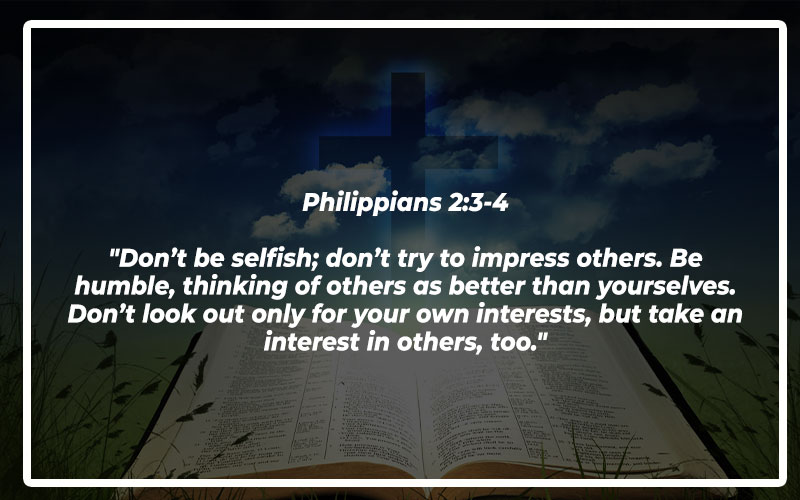Selflessness is a virtue that is highly esteemed in the Bible. It involves putting others’ needs before our own and serving others with a humble heart. Through the teachings of Jesus and the apostles, we are called to live selfless lives, reflecting God’s love and grace to those around us. Below are Bible verses that highlight the importance of selflessness in the Christian walk.
Also Read: Bible Verses About Cheerful Giver
The Example of Jesus
Jesus Christ is the ultimate example of selflessness. His life, ministry, and sacrificial death on the cross demonstrate the greatest act of love and humility. By examining His actions and teachings, we gain a clearer understanding of what it means to live selflessly.
Philippians 2:3-4
“Don’t be selfish; don’t try to impress others. Be humble, thinking of others as better than yourselves. Don’t look out only for your own interests, but take an interest in others, too.”

This verse encourages believers to reject selfishness and embrace humility. By considering others better than ourselves, we cultivate a mindset that values and prioritizes the well-being of those around us. This reflects the selfless nature of Christ.
John 13:14-15
“And since I, your Lord and Teacher, have washed your feet, you ought to wash each other’s feet. I have given you an example to follow. Do as I have done to you.”
Jesus’ act of washing the disciples’ feet serves as a powerful example of servitude and humility. He calls us to follow His example, serving others with the same love and dedication. This selflessness is a hallmark of Christian discipleship.
Mark 10:45
“For even the Son of Man came not to be served but to serve others and to give his life as a ransom for many.”
Jesus came to serve, not to be served. His life was characterized by acts of service and ultimately, His sacrificial death. By following His example, we learn to prioritize serving others, embodying true selflessness in our daily lives.
Luke 22:27
“Who is more important, the one who sits at the table or the one who serves? The one who sits at the table, of course. But not here! For I am among you as one who serves.”
Jesus challenged the conventional view of greatness by identifying Himself as one who serves. This radical teaching invites us to adopt a servant-hearted approach in our interactions, demonstrating selflessness through our willingness to serve others.
Matthew 20:28
“For even the Son of Man came not to be served but to serve others and to give his life as a ransom for many.”
This verse highlights the ultimate act of selflessness: Jesus giving His life for humanity. His sacrificial love sets the standard for how we should live, putting others’ needs above our own and serving with a heart full of love and compassion.
Loving Others as Yourself
The Bible repeatedly emphasizes the importance of loving others as we love ourselves. This kind of love is selfless and seeks the best for others. It calls us to go beyond our own interests and genuinely care for the well-being of those around us.
Matthew 22:39
“A second is equally important: ‘Love your neighbor as yourself.’”
This commandment from Jesus underscores the importance of selflessness in relationships. Loving our neighbor as ourselves means treating others with the same respect, care, and compassion that we desire, reflecting God’s love through our actions.
Galatians 5:14
“For the whole law can be summed up in this one command: ‘Love your neighbor as yourself.’”
Paul reiterates Jesus’ teaching, emphasizing that loving others fulfills the law. This selfless love is the essence of Christian living, driving us to act in ways that uplift and support those around us, embodying the love of Christ.
1 John 4:20
“If someone says, ‘I love God,’ but hates a fellow believer, that person is a liar; for if we don’t love people we can see, how can we love God, whom we cannot see?”
This verse challenges us to examine the authenticity of our love for God. True love for God is reflected in our love for others. Selflessness is demonstrated by our genuine care and concern for our fellow believers, mirroring the love of God.
James 2:8
“Yes indeed, it is good when you obey the royal law as found in the Scriptures: ‘Love your neighbor as yourself.’”
James reinforces the principle of loving our neighbors, highlighting it as a fundamental aspect of our faith. This commandment calls us to selflessly serve and support others, reflecting the heart of God’s law through our actions and attitudes.
Romans 13:9
“For the commandments say, ‘You must not commit adultery. You must not murder. You must not steal. You must not covet.’ These—and other such commandments—are summed up in this one commandment: ‘Love your neighbor as yourself.'”
Paul emphasizes that all the commandments are fulfilled through love. By loving our neighbors as ourselves, we naturally uphold God’s laws. This selfless love is the foundation of our ethical and moral conduct, guiding us in our interactions with others.
Serving Others
Serving others is a practical expression of selflessness. The Bible encourages us to use our gifts, time, and resources to help those in need. By serving others, we demonstrate God’s love in action and fulfill our calling as His followers.
1 Peter 4:10
“God has given each of you a gift from his great variety of spiritual gifts. Use them well to serve one another.”
Peter reminds believers that their spiritual gifts are meant for serving others. This selfless use of our God-given talents builds up the body of Christ and helps meet the needs of those around us, reflecting God’s generosity and grace.
Galatians 5:13
“For you have been called to live in freedom, my brothers and sisters. But don’t use your freedom to satisfy your sinful nature. Instead, use your freedom to serve one another in love.”
Paul encourages believers to use their freedom in Christ to serve others. True freedom is found in selfless love and service, not in pursuing our own desires. By serving one another, we fulfill our purpose and demonstrate the love of Christ.
Mark 9:35
“He sat down, called the twelve disciples over to him, and said, ‘Whoever wants to be first must take last place and be the servant of everyone else.'”
Jesus teaches that true greatness lies in serving others. This countercultural message challenges us to embrace humility and selflessness, prioritizing the needs of others above our own ambitions and desires.
Romans 12:10
“Love each other with genuine affection, and take delight in honoring each other.”
Paul calls for genuine love and honor among believers. This selfless affection involves putting others’ needs first and delighting in their well-being, creating a community that reflects the love and grace of God.
Hebrews 13:16
“And don’t forget to do good and to share with those in need. These are the sacrifices that please God.”
The author of Hebrews urges believers to continually do good and share with those in need. Such selfless acts are pleasing to God and reflect His character, demonstrating the practical outworking of our faith in daily life.
Also Read: Bible Verses About Putting Others First
Humility
Humility is a key aspect of selflessness. The Bible teaches that we should humble ourselves before God and others, recognizing our need for His grace and the importance of valuing others above ourselves. This humility leads to a life of service and love.
Philippians 2:3
“Don’t be selfish; don’t try to impress others. Be humble, thinking of others as better than yourselves.”
Paul exhorts believers to reject selfishness and embrace humility. By considering others better than ourselves, we cultivate a selfless attitude that values and prioritizes the well-being of those around us, reflecting the humility of Christ.
James 4:10
“Humble yourselves before the Lord, and he will lift you up in honor.”
James encourages believers to humble themselves before God. True humility involves recognizing our dependence on Him and submitting to His will. This selfless posture allows God to exalt us in His timing, demonstrating the power of humility.
1 Peter 5:5
“In the same way, you who are younger must accept the authority of the elders. And all of you, dress yourselves in humility as you relate to one another, for ‘God opposes the proud but gives grace to the humble.'”
Peter calls for mutual humility among believers. By clothing ourselves in humility, we create an environment of selflessness and grace, where God’s favor and blessing can flourish, promoting unity and love within the community.
Proverbs 22:4
“True humility and fear of the Lord lead to riches, honor, and long life.”
This proverb highlights the rewards of humility and reverence for God. By living selflessly and humbly, we align ourselves with God’s purposes and experience the blessings that come from honoring Him and others.
Micah 6:8
“No, O people, the Lord has told you what is good, and this is what he requires of you: to do what is right, to love mercy, and to walk humbly with your God.”
Micah summarizes God’s requirements for His people: justice, mercy, and humility. Walking humbly with God involves a selfless attitude that prioritizes His will and the well-being of others, leading to a life that reflects His character and love.
Generosity
Generosity is a practical expression of selflessness. The Bible encourages us to be generous with our resources, time, and love. By giving freely, we reflect God’s generosity and help meet the needs of those around us, demonstrating His love in action.
2 Corinthians 9:7
“You must each decide in your heart how much to give. And don’t give reluctantly or in response to pressure. ‘For God loves a person who gives cheerfully.'”
Paul emphasizes the importance of cheerful giving. Generosity should stem from a willing and joyful heart, reflecting God’s own generous nature. This selfless attitude in giving blesses both the giver and the recipient.
Proverbs 11:25
“The generous will prosper; those who refresh others will themselves be refreshed.”
This proverb highlights the reciprocal nature of generosity. By selflessly giving to others, we also receive blessings in return. This principle encourages a lifestyle of generosity, fostering a community where everyone’s needs are met.
Acts 20:35
“And I have been a constant example of how you can help those in need by working hard. You should remember the words of the Lord Jesus: ‘It is more blessed to give than to receive.’”
Paul reminds the believers of Jesus’ teaching on the blessings of giving. Selfless generosity not only meets the needs of others but also brings spiritual fulfillment and joy to the giver, embodying the heart of Christ’s ministry.
Luke 6:38
“Give, and you will receive. Your gift will return to you in full—pressed down, shaken together to make room for more, running over, and poured into your lap. The amount you give will determine the amount you get back.”
Jesus teaches that generous giving leads to abundant blessings. This principle of reciprocity encourages believers to give selflessly, trusting that God will provide for their needs and bless them abundantly in return.
Proverbs 3:27
“Do not withhold good from those who deserve it when it’s in your power to help them.”
This proverb calls for proactive generosity. When we have the ability to help others, we should do so without hesitation. This selfless attitude of giving reflects God’s love and ensures that we contribute positively to the lives of those around us.
Forgiveness
Forgiveness is a profound act of selflessness. The Bible teaches us to forgive others as God has forgiven us. By letting go of grudges and extending grace, we demonstrate the transformative power of God’s love and foster reconciliation and peace.
Colossians 3:13
“Make allowance for each other’s faults, and forgive anyone who offends you. Remember, the Lord forgave you, so you must forgive others.”

Paul encourages believers to practice forgiveness, reminding them of God’s grace. Selflessly forgiving others reflects the forgiveness we have received from God, promoting healing and unity within the community of faith.
Ephesians 4:32
“Instead, be kind to each other, tenderhearted, forgiving one another, just as God through Christ has forgiven you.”
Paul calls for kindness and forgiveness, mirroring God’s forgiveness through Christ. Selfless forgiveness fosters a compassionate and loving environment, where relationships can thrive and God’s love is visibly demonstrated.
Matthew 6:14-15
“If you forgive those who sin against you, your heavenly Father will forgive you. But if you refuse to forgive others, your Father will not forgive your sins.”
Jesus teaches that our willingness to forgive others impacts our own forgiveness from God. This principle underscores the importance of selflessness in forgiveness, aligning our hearts with God’s grace and mercy.
Mark 11:25
“But when you are praying, first forgive anyone you are holding a grudge against, so that your Father in heaven will forgive your sins, too.”
Jesus emphasizes the necessity of forgiveness in prayer. Selflessly letting go of grudges and forgiving others clears the way for our own forgiveness and a deeper relationship with God, demonstrating the power of grace in action.
Luke 6:37
“Do not judge others, and you will not be judged. Do not condemn others, or it will all come back against you. Forgive others, and you will be forgiven.”
Jesus calls for a non-judgmental and forgiving attitude. By selflessly forgiving others, we align ourselves with God’s grace and mercy, fostering a spirit of love and compassion that reflects the heart of the gospel.
Unity in the Body of Christ
Unity in the body of Christ is built on selflessness. The Bible encourages believers to work together in harmony, valuing each other’s contributions and prioritizing the common good. This selfless unity strengthens the church and glorifies God.
Ephesians 4:2-3
“Always be humble and gentle. Be patient with each other, making allowance for each other’s faults because of your love. Make every effort to keep yourselves united in the Spirit, binding yourselves together with peace.”
Paul calls for humility, gentleness, and patience to maintain unity in the church. Selfless love and forgiveness are essential for fostering a harmonious community that reflects God’s love and brings glory to His name.
1 Corinthians 1:10
“I appeal to you, dear brothers and sisters, by the authority of our Lord Jesus Christ, to live in harmony with each other. Let there be no divisions in the church. Rather, be of one mind, united in thought and purpose.”
Paul urges the church to live in unity, avoiding divisions. This selfless pursuit of harmony strengthens the body of Christ, enabling believers to work together effectively and reflect God’s love to the world.
Colossians 3:14
“Above all, clothe yourselves with love, which binds us all together in perfect harmony.”
Paul emphasizes the importance of love in achieving unity. Selfless love binds believers together, creating a strong and harmonious community that glorifies God and advances His kingdom.
Romans 12:16
“Live in harmony with each other. Don’t be too proud to enjoy the company of ordinary people. And don’t think you know it all!”
Paul encourages believers to live in harmony and avoid pride. This selfless attitude fosters a sense of equality and mutual respect within the church, promoting unity and reflecting the humility of Christ.
Psalm 133:1
“How wonderful and pleasant it is when brothers live together in harmony!”
This psalm celebrates the beauty of unity among God’s people. Selfless living contributes to this harmony, creating an environment where love, peace, and joy abound, bringing delight to God’s heart.
Also Read: Bible Verses About to Those Whom Much Is Given
What Does the Bible Say About Selflessness
Selflessness is a key virtue taught in the Bible. It means putting others before yourself, thinking about their needs and feelings, and acting with kindness and love. The Bible teaches that being selfless is important because it reflects the love and sacrifice that Jesus showed to everyone.
When we are selfless, we show that we care about others and are willing to help them. This can be in small ways, like sharing our food, giving someone a ride, or simply listening when someone needs to talk. It can also be in bigger ways, like donating money to those in need, volunteering our time, or even risking our own comfort to help someone else.
The Bible shows us many examples of selflessness. One example is the story of the Good Samaritan. In this story, a man helps someone who was hurt, even though others had passed by without helping. The Samaritan used his own money and time to take care of the injured man. This story teaches us to help others, even if it means going out of our way or using our own resources.
Selflessness is also about humility. It means not thinking that we are better or more important than others. Instead, we should see everyone as valuable and worthy of love and respect. This kind of humility helps us to serve others with a genuine heart.
When we practice selflessness, we become more like Jesus. Jesus showed the ultimate act of selflessness by giving His life for us. He cared more about our well-being than His own comfort or safety. By following His example, we can make a positive difference in the lives of those around us.
In our daily lives, we can strive to be selfless by being kind, generous, and thoughtful. Even small acts of selflessness can have a big impact and can help to spread love and kindness in our communities.

